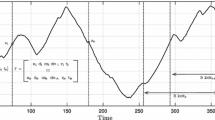Abstract
A new Weighted Multiple Support Vector Regression Models Based on Clustering Algorithm is proposed to model dynamic system. Firstly, SOM and k-means clustering algorithm is applied to partition the whole training set into several disjointed regions. Secondly, the best weighted combination of different kernel function of SVR fit each partitioned cluster. Finally, this new approach is applied to time-series prediction problems, the results show that the learning strategy has effective improvement in the generalization performance in comparison with the single SVR model.
Access this chapter
Tax calculation will be finalised at checkout
Purchases are for personal use only
Similar content being viewed by others
References
Vapnik V (1995) The Nature of Statistical Learning Theory. Springer, New York
Ramírez J, Górriz JM, Salas-Gonzalez D et al (2013) Computer-aided diagnosis of Alzheimer’s type dementia combining support vector machines and discriminant set of features. Inf Sci 237:59–72
Cao XB, Xu YW, Chen D et al (2009) Associated evolution of a support vector machine-based classifier for pedestrian detection. Inf Sci 179(8):1070–1077
Gérard B, Lauer F, Colin G et al (2008) Support vector regression from simulation data and few experimental samples. Inf Sci 178(20):3813–3827
Yeh IC, Yang KJ, Ting TM (2009) Knowledge discovery on RFM model using Bernoulli sequence. Expert Syst Appl 36(3-part-P2):5866–5871
Jacobs RA, Jordan MI, Nowlan SJ et al (1991) Adaptive mixtures of local experts. Neural Comput 3(1):79–87
Jordan MI, Jacobs RA (1994) Hierarchical mixtures of experts and the EM algorithm
Kohonen T (1995) Self organizing maps. Ser Inf Sci 30(4):266–270
Selim SZ, Ismail MA (1984) K-means-type algorithms: a generalized convergence theorem and characterization of local optimality. IEEE Trans Pattern Anal Mach Intell 6(1):81–87
Kwok JT (1998) Support vector mixture for classification and regression problems
Hashem S, Schmeiser B (1995) Improving model accuracy using optimal linear combinations of trained neural networks. IEEE Trans Neural Networks 6(3):792–794
Perrone MP, Cooper LN (1993) When networks disagree: ensemble methods for hybrid neural networks. How We Learn; How We Remember: Toward An Understanding Of Brain And Neural Systems: Selected Papers of Leon N Cooper
Mackey M, Glass L (1977) Oscillation and chaos in physiological control systems. Science 197(4300):287–289
Smola AJ, Schölkopf B (2004) A tutorial on support vector regression. Stat Comput 14(3):199–222
Acknowledgments
This work was supported by the National Natural Science Foundation of China (Grant No. 61572073), Beijing University of Science and Technology Central University Fundamental Research Funds (FRF-BD-17-002A).
Author information
Authors and Affiliations
Corresponding author
Editor information
Editors and Affiliations
Rights and permissions
Copyright information
© 2020 Springer Nature Singapore Pte Ltd.
About this paper
Cite this paper
Wang, L., Li, K., Ma, Q. (2020). Weighted Multiple Support Vector Regression Models Based on Clustering Algorithm. In: Jia, Y., Du, J., Zhang, W. (eds) Proceedings of 2019 Chinese Intelligent Systems Conference. CISC 2019. Lecture Notes in Electrical Engineering, vol 594. Springer, Singapore. https://doi.org/10.1007/978-981-32-9698-5_67
Download citation
DOI: https://doi.org/10.1007/978-981-32-9698-5_67
Published:
Publisher Name: Springer, Singapore
Print ISBN: 978-981-32-9697-8
Online ISBN: 978-981-32-9698-5
eBook Packages: Intelligent Technologies and RoboticsIntelligent Technologies and Robotics (R0)




